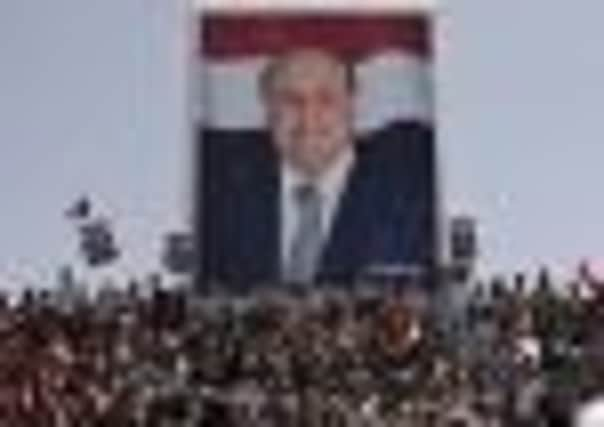Yemen elects a new leader, but risk of civil war remains


In the capital, Sanaa, new posters of the sole candidate, vice-president Abd-Rabbu Mansour Hadi, have been plastered over the peeling scraps of Mr Saleh’s moustachioed image – a visible sign of a fourth Arab autocrat’s demise in the wake of revolutions in Tunisia, Egypt and Libya.
Mr Hadi, 66, became acting president when Mr Saleh stepped aside in November under a deal hammered out by Yemen’s Gulf neighbours and backed by the United States.
Advertisement
Hide AdAdvertisement
Hide AdBut civil war remains a real risk in a country facing an offshoot of al-Qaeda, an economic crisis that has brought it to the brink of famine, a rebellion in the north and a southern secessionist movement.
Political analyst Abdulghani al-Iryani said: “If the new government fails to fulfil its obligations to reach out and re-integrate the southerners, the Houthis [northerners] and the youth … then conflict will be inevitable.”
The power transfer, brokered by the six-nation Gulf Co-operation Council, has been touted by regional and Western powers as a triumph of diplomacy. Yet most Yemenis see Mr Hadi only as a caretaker. If he is unable to keep warring interests within the military from getting out of hand, many fear Yemen will be torn apart by those hoping to exploit a power vacuum.
Southerners, who accuse the more traditionally Islamist north of usurping their resources and discriminating against them, have said they will boycott the election because it confers legitimacy on a political process to which they were not party.
As well as increasingly vocal secessionists, Islamist militants suspected of having links to al-Qaeda have exploited weak central government control to expand their foothold in the south, seizing several towns over the past year.
Apart from al-Qaeda’s interest in using Yemen as a base, Saudi Arabia suspects Shiite power Iran of supporting Houthi rebels in the north. The Shiite group has regained some of the momentum it lost when Saudi Arabia sent troops to the border in 2009 to suppress a rebellion.
Holding the country together will be a feat – let alone drafting a constitution and holding a referendum to pave the way for a multi-party election in two years’ time, the plan laid out in the Gulf initiative.
Mr Saleh, who is in New York for medical treatment for injuries suffered in a bomb attack against him last June, has vowed to return and lead his General People’s Congress party, casting doubt on his commitment to give up power.
Advertisement
Hide AdAdvertisement
Hide AdEven if he lets go, members of his inner circle retain key positions, including his son, Ahmed Ali, who commands the Republican Guards, and his nephew, Yehia, who leads the Central Security Forces. They are locked in a stand-off with tribal leader Sadeq al-Ahmar and dissident General Ali Mohsen.
Although Mr Saleh was deeply unpopular, as shown by the entrenched street protests against him, there is little doubt his iron fist held Yemen together, a task he once likened to “dancing on the heads of snakes”.
Abdulkarim Al-Mugni, 38, a mechanic, said: “Ali Abdullah Saleh unified our country, something that no Yemeni leader has ever done before. Even if he leaves, I am sure his influence will pervade Yemen for years.”
One emerging hope is that the deal to remove Mr Saleh could pave the way for much-needed foreign aid and investment into the country of 24 million, where 42 per cent of the population lives on less than $2 per day.
Shortages of electricity, water and fuel have sent prices skywards, with inflation running as high as 60 per cent, levels unseen since 1995.
The International Monetary Fund has said it is ready to discuss fresh aid when Yemen is calmer, but it may not be willing until there is a government in place that can adopt and implement economic reforms.
Ahmed al-Haifi, the owner of a battered motorbike taxi in Sanaa, was unconvinced.
He said: “These are communist-style elections. What an embarrassment for Yemen and its people … I have no hope that the elections will change anything for anyone. What do elections mean to me when I can barely afford to buy petrol?”